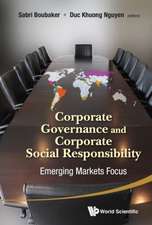Non-Cooperation — The Dark Side of Strategic Alliances
Autor W. Suenen Limba Engleză Hardback – 10 iun 2005
| Toate formatele și edițiile | Preț | Express |
|---|---|---|
| Paperback (1) | 635.15 lei 6-8 săpt. | |
| Palgrave Macmillan UK – 10 iun 2005 | 635.15 lei 6-8 săpt. | |
| Hardback (1) | 639.59 lei 6-8 săpt. | |
| Palgrave Macmillan UK – 10 iun 2005 | 639.59 lei 6-8 săpt. |
Preț: 639.59 lei
Preț vechi: 752.45 lei
-15% Nou
Puncte Express: 959
Preț estimativ în valută:
122.38€ • 127.78$ • 101.29£
122.38€ • 127.78$ • 101.29£
Carte tipărită la comandă
Livrare economică 05-19 aprilie
Preluare comenzi: 021 569.72.76
Specificații
ISBN-13: 9781403945655
ISBN-10: 1403945659
Pagini: 212
Ilustrații: XVIII, 212 p. 3 illus.
Dimensiuni: 140 x 216 x 18 mm
Greutate: 0.4 kg
Ediția:2005
Editura: Palgrave Macmillan UK
Colecția Palgrave Macmillan
Locul publicării:London, United Kingdom
ISBN-10: 1403945659
Pagini: 212
Ilustrații: XVIII, 212 p. 3 illus.
Dimensiuni: 140 x 216 x 18 mm
Greutate: 0.4 kg
Ediția:2005
Editura: Palgrave Macmillan UK
Colecția Palgrave Macmillan
Locul publicării:London, United Kingdom
Cuprins
List of Figures and Tables Foreword Acknowledgements List of Abbreviations Used PART 1: THE DARK SIDE OF STRATEGIC ALLIANCES What is a Strategic Alliance Alliances: The Double-Edged Sword Organization of the Book PART 2: THE CHALLENGE OF NON-COOPERATION Assumptions Cooperation and Non-Cooperation Influences on the Firm's Attitude Toward Alliance Summary PART 3: POWER AND INTERDEPENDENCE: THE FIRM'S ABILITY TO ACT Defining Power and Interdependence Measuring Power and Interdependence Applying Power and Interdependence PART 4: MICROSOFT: POWER AND THE LIMITS OF POWER Why Microsoft? Influences on the Firm's Behaviour Power and Interdependence Microsoft in the PC Market: Exercising Power Microsoft and Technology Convergence: The Limits of Power Conclusions PART 5: POWERING THE FUEL CELL VEHICLE Technologies and Markets Ballard Power Systems Power and Interdependence Constructing Interdependence Conclusions PART 6: GLOBAL AIRLINE ALLIANCES: CONSTRUCTING INTERDEPENDENCE Industry Environment The Rise of Alliance Influences on Firm Behaviour Behaviours Power and Interdependence Historical Alliances Swissair Modern Era of Global Alliances Conclusions PART 7: PUTTING THE FIRM BACK INTO ALLIANCE Lessons Learned Managerial Implications Going Forward
Recenzii
'The alliance field is already congested with books and articles that all too often follow well-worn paths. This book is different. It aims to redress some imbalances in the conventional wisdom in the field and to introduce new perspectives. As such, it justifies our attention in a crowded field and deserves to be studied by alliance scholars and managers alike.' - Benjamin Gomes-Casseres, Professor of International Business, Brandeis University, USA
'Firms must be as wary of their partners as their competitors. This book offers unique insights into the role of power and interdependence in sustaining alliances and in allocating their gains fairly or unfairly, depending upon one's point of view. Wilma Suen's theory opens a promising new avenue for interdisciplinary academic researchers to build upon, and may prove invaluable to business leaders watching their backs and their allies.' - Lee W. McKnight, Associate Professor of Information Studies, Syracuse University, USA; Research Affiliate, Massachusetts Institute of Technology, USA; and Founder, Chairman, President, and interim CEO, Wireless Grids Corporation, USA
'Firms cooperate to compete. Understood as a means towards an end strategic alliances are a key component of corporate global strategies as long as they are used opportunistically. Asking why do strategic alliances fail this path-breaking book focuses on their dark side - the why and how of non-cooperation which result in the demise of 50% ofall alliances. By forcing managers to take a realistic view of alliances dynamic costs/benefits ratio this study will guide any executives designing new alliances, managing existing alliances or scheming exit from stalled alliances. A must read for the savvy and nimble geocentric manager of the twenty-first-century.' - Laurent L. Jacque, Academic Dean and Walter B. Wriston Professor of International Finance and Banking, The Fletcher School, Tufts University, USA; and HEC School of Management, France
'Firms must be as wary of their partners as their competitors. This book offers unique insights into the role of power and interdependence in sustaining alliances and in allocating their gains fairly or unfairly, depending upon one's point of view. Wilma Suen's theory opens a promising new avenue for interdisciplinary academic researchers to build upon, and may prove invaluable to business leaders watching their backs and their allies.' - Lee W. McKnight, Associate Professor of Information Studies, Syracuse University, USA; Research Affiliate, Massachusetts Institute of Technology, USA; and Founder, Chairman, President, and interim CEO, Wireless Grids Corporation, USA
'Firms cooperate to compete. Understood as a means towards an end strategic alliances are a key component of corporate global strategies as long as they are used opportunistically. Asking why do strategic alliances fail this path-breaking book focuses on their dark side - the why and how of non-cooperation which result in the demise of 50% ofall alliances. By forcing managers to take a realistic view of alliances dynamic costs/benefits ratio this study will guide any executives designing new alliances, managing existing alliances or scheming exit from stalled alliances. A must read for the savvy and nimble geocentric manager of the twenty-first-century.' - Laurent L. Jacque, Academic Dean and Walter B. Wriston Professor of International Finance and Banking, The Fletcher School, Tufts University, USA; and HEC School of Management, France
Notă biografică
WILMA W. SUEN is a consultant in the technology and the airline industries, working with private and public sector clients. She has been specializing in corporate alliance issues since 1998. A native of Vancouver, she holds degrees from the University of British Columbia, the London School of Economics and the Fletcher School at Tufts University.








